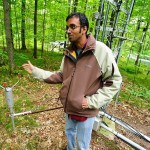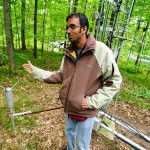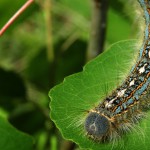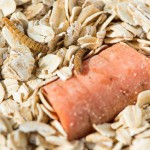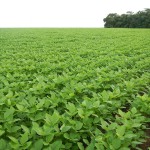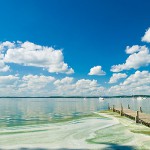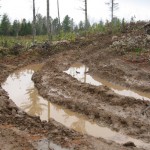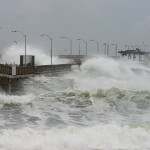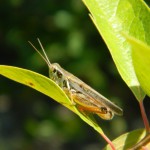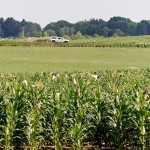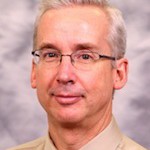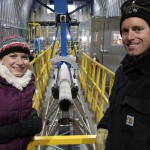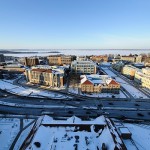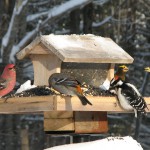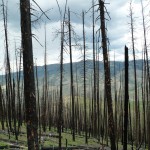Tag Environment
New materials repel oil underwater, could better clean up oil spills
University of Wisconsin–Madison researchers have announced a significant step forward in the development of materials that can ward off oil - a discovery that could lead to new protective coatings and better approaches to cleaning up oil spills.
Team tracks the uncertain climate footprint of wetlands
When is a wetland a sink and when is a wetland a source?
Researchers aim to broaden understanding of how toxins affect the body
Even in an era in which there is increased emphasis on living "green," humans are constantly exposed to a wide range of toxins in everything from our air, food and water to the goods we buy.
Munching bugs thwart eager trees, reducing the carbon sink
A new study published today [Monday, March 2, 2015] in Nature Plants shows that hungry, plant-eating insects may limit the ability of forests to take up elevated levels of carbon dioxide in the atmosphere, reducing their capacity to slow human-driven climate change.
Study shows Brazil’s Soy Moratorium still needed to preserve Amazon
Today, fewer chicken nuggets can trace their roots to cleared Amazon rain forest.
Humanity has exceeded 4 of 9 ‘planetary boundaries,’ according to researchers
An international team of researchers says climate change, the loss of biosphere integrity, land-system change, and altered biogeochemical cycles like phosphorus and nitrogen runoff have all passed beyond levels that put humanity in a “safe operating space.” Civilization has crossed four of nine so-called planetary boundaries as the result of human activity, according to a report published today in Science by the 18-member research team. Among them is Steve Carpenter, director of the University of Wisconsin–Madison Center for Limnology and the only U.S.-based researcher on the study.
Muddy forests, shorter winters present challenges for loggers
Stable, frozen ground has long been recognized a logger’s friend, capable of supporting equipment and trucks in marshy or soggy forests. Now, a comprehensive look at weather from 1948 onward shows that the logger’s friend is melting. The study, published in the current issue of the Journal of Environmental Management, finds that the period of frozen ground has declined by an average of two or three weeks since 1948.
Study models the past to understand the future of strengthening El Niño
El Niño is not a contemporary phenomenon; it’s long been the Earth’s dominant source of year-to-year climate fluctuation. But as the climate warms and the feedbacks that drive the cycle change, researchers want to know how El Niño will respond. A team of researchers led by the University of Wisconsin’s Zhengyu Liu will publish the latest findings in this quest Nov. 27 in Nature.
Grasshoppers signal slow recovery of post-agricultural woodlands, study finds
New research by Philip Hahn and John Orrock at the University of Wisconsin–Madison on the recovery of South Carolina longleaf pine woodlands once used for cropland shows just how long lasting the legacy of agriculture can be in the recovery of natural places. By comparing grasshoppers found at woodland sites once used for agriculture to similar sites never disturbed by farming, Hahn and Orrock show that despite decades of recovery, the numbers and types of species found in each differ.
Crops play a major role in the annual CO2 cycle increase
In a study published Wednesday, Nov. 19, in Nature, scientists at Boston University, the University of New Hampshire, the University of Michigan, the University of Minnesota, the University of Wisconsin–Madison and McGill University show that a steep rise in the productivity of crops grown for food accounts for as much as 25 percent of the increase in this carbon dioxide (CO2) seasonality.
New master’s program in energy conservation is first of its kind
A new professional master's program will launch at the University of Wisconsin–Madison in fall 2015 and become the first in the world specifically designed to train analytically minded students to evaluate energy efficiency and other resource-conservation initiatives.
They know the drill: UW leads the league in boring through ice sheets
Hollow coring drills designed and managed by UW–Madison’s Ice Drilling Design and Operations (IDDO) program are used to extract ice cores that can analyze the past atmosphere. Shaun Marcott, an assistant professor of geoscience at UW–Madison, was the first author of a paper published today in the journal Nature documenting carbon dioxide in the atmosphere between 23,000 and 9,000 years ago, based on data from an 11,000-foot hole in Antarctica.
When the isthmus is an island: Madison’s hottest, and coldest, spots
In a new study published this month in the Journal of Applied Meteorology and Climatology, University of Wisconsin–Madison researchers highlight the urban heat island effect in Madison: The city’s concentrated asphalt, brick and concrete lead to higher temperatures than its nonurban surroundings.
Climate change alters cast of winter birds
Over the past two decades, the resident communities of birds that attend eastern North America’s backyard bird feeders in winter have quietly been remade, most likely as a result of a warming climate. Writing this week in the journal Global Change Biology, University of Wisconsin–Madison wildlife biologists Benjamin Zuckerberg and Karine Princé document that once rare wintering bird species are now commonplace in the American Northeast.
Mountain pine beetles get a bad rap for wildfires, study says
Mountain pine beetles get a bad rap, and understandably so. The grain-of-rice-sized insects are responsible for killing pine trees over tens of millions of acres in the Western U.S. and Canada over the last decade. But contrary to popular belief, these pests may not be to blame for more severe wildfires like those that have recently swept through the region. Instead, according to a new study by UW–Madison zoology professor Monica Turner, weather and topography play a greater role in the ecological severity of fires than these bark-boring beetles.
Actions on climate change bring better health, study says
The number of extremely hot days in Eastern and Midwestern U.S. cities is projected to triple by mid-century, according to a new study led by University of Wisconsin–Madison researchers and published today in the Journal of the American Medical Association.


